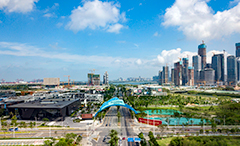Pilot FTZs get support to innovate
2018-11-24
China Daily
China will increase support for reform and innovation at its pilot free trade zones with measures unveiled on Nov 23 to improve the investment environment and trade facilitation.
Fifty-three measures released in a notice from the State Council are aimed at giving the country’s 12 pilot FTZs greater freedom in reform and opening-up and greater policy support, said Tang Wenhong, head of the department of foreign investment at the Ministry of Commerce, in a policy briefing of the State Council Information Office.
Tang said the measures are intended to further streamline administration, step up compliance oversight and services and promote innovation and exploration at pilot FTZs.
The notice also includes measures to promote financial innovation to better serve the real economy and support more exploration in human resources at pilot FTZs.
The rule on the percentage of foreign technicians will be relaxed for foreign investment in construction project design companies. Approvals for foreign investors setting up construction-related businesses will be delegated from provincial authorities to pilot FTZs.
Foreign carriers will be allowed to offer passenger and cargo services from Zhengzhou, Henan province, and Xi’an, Shaanxi province, both capitals of provinces with pilot FTZs, to other countries, the notice said.
One-stop service for international trade will also cover freight shipping bills for air and railway service. Medical institutes within pilot FTZs will be able to conduct research programs in cutting-edge technologies related to stem cells. Also, taxation services in line with international standards will be rolled out at pilot FTZs, according to the notice.
The Chongqing Pilot Free Trade Zone will set up a special port for drugs and biological products imported for the first time.
Chen Zhenchong, an official with the department of pilot FTZs and special region development under the General Administration of Customs, said more measures will be adopted to enhance connectivity and information sharing with key countries involved in the Belt and Road Initiative.
Chen said at the briefing that red tape will be further cut for auto imports to reduce costs for importers so Chinese consumers can buy cheaper and better cars.
The total volume for imports and exports in China’s pilot FTZs reached 2.6 trillion yuan ($374.4 billion) in 2017, or 9.35 percent of the country’s total, according to the customs administration.


